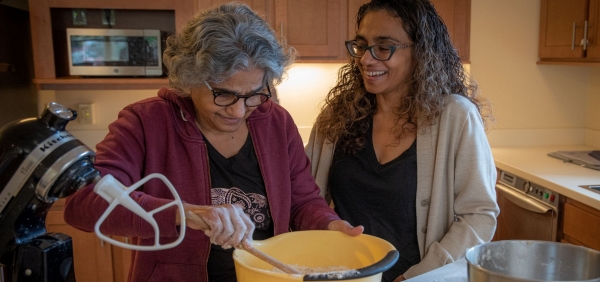How to Have Good Conversations with a Parent with Dementia

Communication is an important part of human connection. It allows us to bridge differences, get our needs met and maintain relationships. But if your loved one has dementia, their ability to communicate can suffer, making it difficult to address their practical needs and to maintain that familiar sense of connection. Fortunately, with some adjustments to your own conversational style, you can learn how to talk to a parent with dementia.
A New Approach to Conversation
As memory loss affects your parent’s ability to communicate, they may repeat questions, struggle to find the right words, and have a shorter attention span. These changes can lead to frustration for them—and you. Taking a more deliberate approach to conversation, with an emphasis on listening rather than talking, can help make communication more successful. Here’s how to talk to a parent with dementia:
- Offer undivided attention. Instead of talking to your parent while you put the groceries away or during commercial breaks on the local news, turn off the TV, or other distractions, and sit face-to-face. You’ll better hold their attention and be able to pick up on nonverbal cues that can help you interpret what they’re trying to tell you.
- Simplify. Rather than rattling off a series of questions or statements, reduce the likelihood of confusion by keeping to one topic per sentence. Also avoid open-ended questions, which can be overwhelming. Instead of asking, “What do you want for dinner?” give choices: “Do you want meatloaf or lasagna?”
- Take it slowly. It may be an exercise in patience, but giving your mom or dad ample time to respond—even when it takes them longer than expected—will help them feel heard and can decrease the likelihood that they’ll feel agitated. It will also reduce misunderstandings if you resist the urge to finish their sentences for them.
- Avoid phrases that emphasize your parent’s memory loss. Saying “Don’t you remember” or “I told you” simply reminds your loved one of the distressing fact that they’re not able to remember as they once could.
- Resist correcting minor mistakes. If your parent uses the wrong word or makes other harmless mistakes, let it go. Correcting them will only make them feel bad if they know you’re right, or spark an argument if they don’t believe you.
- Use therapeutic fibs. A person with dementia often experiences a different reality. Your mom may announce that the kids will be home from school soon. Rather than reminding her that you’re her child and haven’t been in school for decades—which can trigger confusion and agitation—try a more creative approach. Agree with her and ask if she’d like to make a snack while she waits. While it may feel like lying, dementia care experts recommend this technique as a way to avoid causing unnecessary distress.
Take Frequent Trips Down Memory Lane
Even as your mom or dad’s conversational abilities decline, their long-term memories may be a means of connection. For many people with dementia, older memories are more firmly established than recent ones, making details from decades ago easier to recall than a conversation a few days ago. Asking questions about their past, looking at old photographs, or listening to favorite songs are just a few ways to prompt your parent to share memories. In the process, you can learn something new about your mom or dad’s life and they can relive happy experiences, which can improve their mood and reduce agitation. What’s more, you’ll have a meaningful way to engage in conversation with your loved one.
If you use verbal prompts, keep your questions general, asking about homelife rather than specific family members, for example. And be sure to avoid asking about painful subjects. Here are a few questions to start with:
- What was the house where you grew up like?
- What did you like best about the work you did?
- What did you enjoy about the holidays when you were a child?
- Do you have a favorite place to visit?
- What did you do for fun when you were young?
Promoting Good Communication Is The Artis Way
At Artis Senior Living, we understand both the value and challenges of communication for people living with dementia, and for their families and caregivers. That understanding informs our guiding principles and it inspires our commitment to providing educational events for families of people living with memory loss. If you have questions about how to have a meaningful conversation with a loved one who has dementia—or any other dementia care topic, including the Memory Care offered in our communities throughout the U.S.—contact us. We’re happy to be a resource for you and your loved one.



